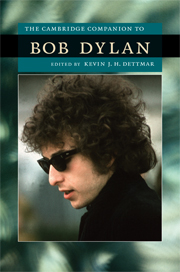Book contents
- Frontmatter
- Introduction
- Part I Perspectives
- Part II Landmark Albums
- 10 The Freewheelin’ Bob Dylan (1963)
- 11 Bringing It All Back Home (1965)
- 12 Highway 61 Revisited (1965)
- 13 Blonde on Blonde (1966)
- 14 The Basement Tapes (1967; 1975)
- 15 Blood on the Tracks (1975)
- 16 Infidels (1983)
- 17 “Love and Theft” (2001)
- Works cited
- Index
11 - Bringing It All Back Home (1965)
from Part II - Landmark Albums
Published online by Cambridge University Press: 28 May 2009
- Frontmatter
- Introduction
- Part I Perspectives
- Part II Landmark Albums
- 10 The Freewheelin’ Bob Dylan (1963)
- 11 Bringing It All Back Home (1965)
- 12 Highway 61 Revisited (1965)
- 13 Blonde on Blonde (1966)
- 14 The Basement Tapes (1967; 1975)
- 15 Blood on the Tracks (1975)
- 16 Infidels (1983)
- 17 “Love and Theft” (2001)
- Works cited
- Index
Summary
It seems almost silly to talk about an album produced more than forty years ago by an artist whose live performances re-imagine his earlier songs so dynamically that they feel like different songs altogether. Forty years is lifetimes ago: why dwell in the past when the present is exploding with mature work - both in performance and in the studio - of such satisfying depth and complexity? Imagining a world before Dylan is like imagining a world before the Internet - the architecture of existence minus an entire dimension. Bringing It All Back Home (1965), more than any other rock album, was a watershed. It took rock and pop, not to mention folk and blues, to a plane of ideas, to the level of art, in which the lyrics were as important as the music - if not more so. Of course Dylan stood on the shoulders of some of our greatest musical treasures, from Hank Williams to Muddy Waters to Elvis. He threw multitudes into the mix, from Yeats to Baudelaire to Ginsberg, inventing a rock poetry that opened the doors for his equally hungry contemporaries - Paul Simon, Leonard Cohen, Neil Young, and Joni Mitchell among them. Picture the times. JFK was dead. Motown was on the radio. The Beatles hadn't put out Rubber Soul yet. The Stones were just picking up steam. And Dylan was off in a corner, writing his masterpieces. Folk-music purists wanted to keep him for themselves. He was their messiah, their justification. “Blowin' in the Wind,” “Chimes of Freedom,” “Masters of War” - a modern troubadour had given birth to himself in New York City, had brought a rock-and-roll attitude to Southern traditional music born of the Church, and to Woody Guthrie's romance with America. Romantic Wild West stories, biblical lament, tragic love gone wrong and the righteous howling pain of what one man does to another (or to a woman) out of hate, ignorance, jealousy: this skinny white boy seemed to be singing from the soul of an ancient black man who had seen it all.
- Type
- Chapter
- Information
- The Cambridge Companion to Bob Dylan , pp. 131 - 136Publisher: Cambridge University PressPrint publication year: 2009



